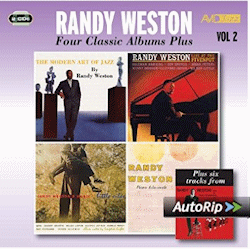CD1
The Modern Art of Jazz
1. Loose Wig
2. Run Joe
3. A Theme for Teddy
4. In a Little Spanish Town
5. Don't Blame Me
6. J & K Blues
7. You Needn't
8. How High the Moon
Piano a la Mode
9. Earth Birth
10. Nobody Knows the Trouble I've Seen
11. Saucer Eyes
12. I Got Rhythm
13. Gingerbread
14. Cocktails for Two
15. Honeysuckle Rose
16. Fe-double-U Blues
Little Niles
17. Earth Birth
18. Little Susan
CD2
1. Nice Ice
2. Little Niles
3. Pam's Waltz
4. Babe's Blues
5. Let's Climb a Hill
Live at the Five Spot
6. High Fly
7. Beef Blues Stew
8. Where
9. Spot Five Blues
10. Star Crossed Lovers
11. Lisa Lovely
Destry Rides Again
12. We're Ladies
13. I Know Your Kind
14. Anyone Would Love You
15. Once Knew a Fella
16. That Ring On the Finger
17. I Say Hello
Randy Weston (piano) with: on The Modern Art of Jazz Cecil Payne (baritone and alto sax): Ray Copeland (trumpet): Ahmed Abdul-Malik (bass): Willie
Jones and Wilbert Hogan (drums) On Piano A La Mode: Peck Morrison (bass): Connie Kay (drums) On Little Niles: Ray Copeland (trumpet):
Idrees Sulieman (trumpet) Melba Liston (trombone, arranger): Johnny Griffin (tenor sax): George Joyner (bass): Charlie Persip (drums) on Live at the Five Spot Kenny Dorham (trumpet): Coleman Hawkins (tenor sax): Wilbur Little (bass): Clifford Jarvis/Roy Haynes (drums): Brock Peters
(vocals): On Destry Rides Again
Melba Liston, Frank Rehak, Slide Hampton, Bennie Green (trombones):
Willie Rodriguez (conga): Peck Morrison (bass): Elvin Jones (drums)
Recorded 1956-60 [78:31 + 78:51]
Randy Weston has been given something of a supercilious ride by some critics but a twofer such as this, culled from LPs made between 1956 and 1960, reveals
many of his very considerable strengths. It’s not enough to write off his Monkish affiliations. True, they were integral stylistically and informed
something of the rhythmic basis of his playing and, to an extent, composing. But when overlaid with strong chromaticism, as can be heard in The Modern Art of Jazz, they extended the vocabulary of his pianism still further. But Weston had plenty in his armoury besides these clear
antecedents. He was attuned to the Caribbean vibe, as can be savoured in Run Joe from the same album, and with a thoroughly tight band – with a
front line of Cecil Payne and Ray Copeland - the corporate sound is bright and burnished. His interest in the waltz as a jazz vehicle is evident and his
slight air of (occasional) frivolity – a quality I admire – can be experienced in his leads and comping on J&K Blues.
Piano a la Mode
is a Spring 1957 trio session with Peck Morrison and Connie Kay. Half of the eight tracks are Weston originals, several featuring his characteristic
humming-along, and some – once again – are in waltz time. Nobody Knows the Trouble I’ve Seen is unusually romanticised, avoiding the temptations
of the dirge, whilst I Got Rhythm is free and easy, at one point heavily on the beat, and at another full of locked chords. He gives a Monkish
twist to Fats’ Honeysuckle Rose. Weston was of part Caribbean descent which imbues Little Susan, from the Little Niles LP with
great vitality. Connoisseurs of the original overwritten sleeve notes will enjoy the words of Harlem Renaissance maestro, Langston Hughes – who, for
reasons best known to others, seems to be making a posthumous comeback. This album features Johnny Griffin as well as the arrangements of Melba Liston
whose somewhat melodramatically filmic work on the title track is one of the many waltz themes that saturate this LP.
A meatier date was Live at the Five Spot, a seat-of-the-pants session that saw Weston team with Coleman Hawkins, Kenny Dorham, Wilbur Little and
Roy Haynes for some fantastic live music making on 26 October 1959. Hawk soars, punchy and rhapsodic, on High Fly and he takes a searing long solo
on Spot Five Blues – at least until he runs out of steam. Everyone is on fine form here – though it’s best to ignore the awful singing of Brock
Peters on Where (‘why’ would have been a better question). Note that tracks 9 and 10 have been swapped – something that I’ve noted before in
Avid’s productions and one of the few sloppy things about their work other than inaccurate track timings (Let’s Climb a Hill lasts 5:51 not 3:51).
The last tracks come from Destry Rides Again, with arrangements once more by Liston. This is a jaunty, rather disposable affair with Weston and a
four-person trombone choir essaying rinky-dink film music.
At Avid’s price bracket their second excursion into the waltz-drenched world of Randy Weston contains many a golden nugget.
Jonathan Woolf
